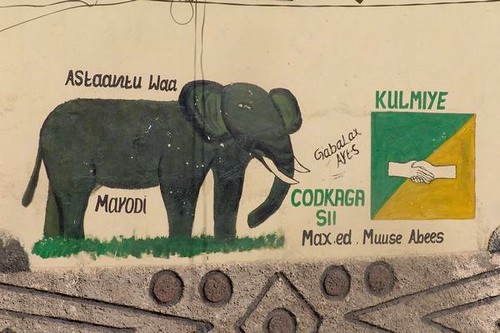Somali discussion
On Saturday, the Evert Vermeer Stichting organised an Afrikadag in The Hague, which I attended after an invitation from Khaalid who I have come to know through the blog. He had organised a Somali Round Table workshop.
With all respect to Khaalid, I found it all rather a disappointing and frustrating experience, albeit a perfect lesson in why Somalia has been without any sort fo government for the last 16 years since the fall of the military dictator Siad Barre. This was the main question which was being posed. Why out of all the countries in the world is it that Somalia is the country which has been unable to have a functioning government, not even a dictatorship, but nothing.
First fo all, despite being on time at the appointed classroom, the session was half empty and there were very few Somalis. Gradually as time went by the room became fuller and fuller, and just like what happened in Birmingham, the Somalis took their own time to attend the seminar.
Khalid introduced the session and handed the floor over to a Dutch jourrnalist who wanted to hear, predominantly from the Somalis their ideas about why Somalia has no functioning government and whether or not the current transitional government has any chnace of succeeding where others have failed.
Well, the discussion started with one elderly gentlemen giving us a potted view of Somali history since the 1950's delivered in a slow deliberate way, much like the Ents in The Lord of the Rings. he was not going to be hurried and when pressed to do so, he became quickly offended. However interesting it was that he was saying, it did not seem to be getting to anywhere near the point and eventually, even at the risk of offending him further, the floor had to be given to someone else.
Well the discussion went all over the place, without getting anywhere at all. There were a couple of flare ups, notably between the two grey beards in the room. In the meantime, I was getting frustrated about the fact that the floor seemed to be ignoring the fact that Somaliland, whether or not a part of Somalia DOES have a functioning government and has had one for almost 16 years. I got the chance to mention this in pointing out that it IS possible to come up with a political system which gives due recognition to the particulars of Somali culture in respect of clans and the elders and so on.
However, despite some support from some of the other people in the room who thought I had made a good point, the journalist reacted with a very catty remark about Somaliland being a very corrupt, to which I replied that many countries are corrupt and that corruption is probably better than the anarchy down south where the economy is controlled by gun wielding warlords. Anyway, he was not having any of it and gradually the discussion got more and more out of control, the main lesson being learned by everyone in the room was to see how difficult it is to get Somalis to agree on anything...
I was told later that we were lucky, as some years similar discussions at Afrikadag became so heated that security men needed to be called in. One thing though, very positive, was the contribution of the young women around the table, illustrating clearly what is often said that if Africa is really going to start progressing in a positive way, it is going to have to give far more say to the women.





0 Comments:
Post a Comment
<< Home